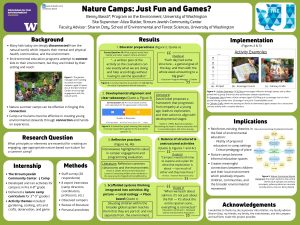Designing Effective Nature Camp Curricula: Educator Preparation, Reflection & Developmental Alignment in Environmental Education
Children today are spending significantly less time outdoors, leading to concerning effects on their health, development, and relationship with the environment. This growing disconnection weakens not only physical and mental well-being but also a sense of environmental responsibility. While formal classroom settings often emphasize global environmental issues, informal learning environments like summer camps provide opportunities for direct, hands-on engagement with nature. However, without intentional curriculum design, these experiences risk being “just fun and games” rather than meaningful educational opportunities. This project aims to determine what principles make a summer nature camp curriculum engaging, age-appropriate, and effective in fostering environmental stewardship. To accomplish this, I conducted a review of literature, eight expert interviews, a staff survey, and considered my internship experience to design an effective nature camp curriculum. For this project I interned at the Stroum Jewish Community Center’s J Camp as a Nature Specialist to design daily nature activities for campers from kindergarten to eighth grade and produce a nature camp curriculum deliverable to be used in future camp sessions. This study combined research, observation, and practice to identify five essential principles of effective curriculum design: educator preparedness, developmental alignment, balanced structure between guided and open-ended learning, systems thinking grounded in local ecology, and reflection. Together, these elements empower educators, increase camper engagement, and foster deeper understanding of human–nature connections. Intentional, place-based programming transforms nature camps into powerful informal education spaces that cultivate curiosity, confidence, and lifelong environmental literacy while laying the foundation for community resilience and future stewardship.
